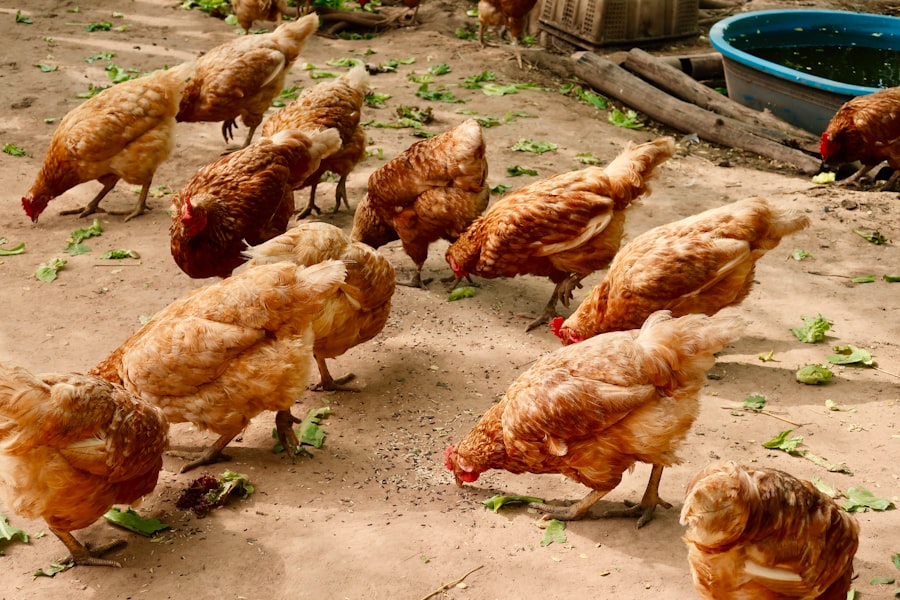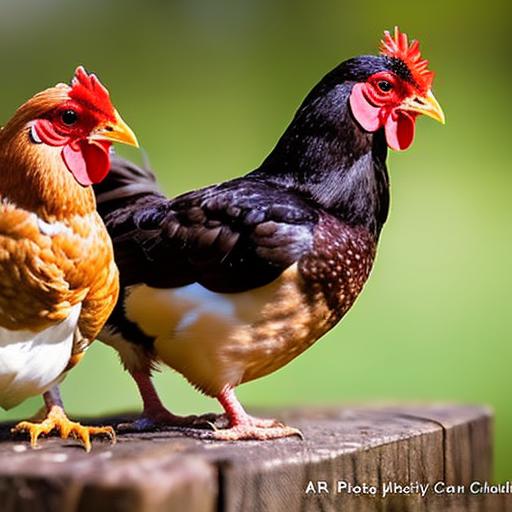Keeping chickens as a hobby has become increasingly popular in recent years. Many people are drawn to the idea of having fresh eggs daily, as well as the joy of watching chickens and their quirky personalities. In addition, chicken manure can be used as a natural fertilizer for gardens. In this article, we will explore the benefits of keeping chickens, the legal requirements for doing so, how to choose the right chicken breed, building a chicken coop, and other important aspects of chicken care.
Key Takeaways
- Keeping chickens has many benefits, including fresh eggs, natural pest control, and fertilizer for your garden.
- Before keeping chickens, it’s important to research and comply with local legal requirements, such as zoning and permit regulations.
- Choosing the right chicken breed depends on factors such as egg production, temperament, and climate adaptability.
- Building a chicken coop requires careful consideration of size, ventilation, and predator protection.
- Proper feeding, watering, and hygiene practices are essential for maintaining the health and well-being of your chickens.
Benefits of Keeping Chickens
One of the main benefits of keeping chickens is having fresh eggs daily. There is nothing quite like gathering eggs from your own backyard and knowing exactly where they came from. Not only are fresh eggs delicious, but they are also more nutritious than store-bought eggs. Chickens that are allowed to roam freely and eat a varied diet produce eggs that are higher in omega-3 fatty acids and vitamins A and E.
Another benefit of keeping chickens is the joy they bring to your life. Chickens have unique personalities and watching them can be highly entertaining. They have their own social hierarchy and will often engage in amusing behaviors such as dust bathing or chasing after bugs. Many chicken owners find that spending time with their flock is a great way to relax and de-stress.
Additionally, chicken manure is an excellent source of fertilizer for gardens. It is rich in nitrogen, phosphorus, and potassium, which are essential nutrients for plant growth. By composting chicken manure and using it in your garden, you can improve soil fertility and reduce the need for synthetic fertilizers. Just be sure to let the manure age for at least six months before using it on edible crops to avoid any potential contamination.
Legal Requirements for Keeping Chickens
Before getting chickens, it is important to familiarize yourself with the legal requirements for keeping them in your area. Different cities and towns have different regulations regarding the number of chickens allowed, coop size and placement, and noise restrictions. Some areas may require a permit or license to keep chickens, while others may prohibit them altogether.
To ensure that you are in compliance with local laws, it is essential to check your local zoning laws and regulations. Contact your city or town hall to inquire about any specific requirements or restrictions. It is also a good idea to talk to your neighbors and make sure they are comfortable with you keeping chickens. Being a considerate and responsible chicken owner will help maintain positive relationships with your community.
Choosing the Right Chicken Breed
When it comes to choosing the right chicken breed, there are several factors to consider. Different breeds have different characteristics in terms of egg production, temperament, and size. Some breeds are known for being excellent layers, while others are more ornamental or suitable for meat production.
If you are primarily interested in having fresh eggs, then you will want to choose a breed that is known for its egg-laying abilities. Popular egg-laying breeds include Rhode Island Reds, Leghorns, and Australorps. These breeds are known for their high egg production and can lay up to 300 eggs per year.
If you are looking for chickens with friendly and docile personalities, then consider breeds such as Silkies or Orpingtons. These breeds are known for being calm and gentle, making them great choices for families with children or those who want chickens as pets.
It is also important to consider the size of the breed and how it will fit into your living situation. Some breeds are larger and more active, requiring more space to roam. If you have a small backyard or live in an urban area, you may want to choose a smaller breed such as a Bantam or a Serama.
Building a Chicken Coop
Having a safe and secure chicken coop is essential for keeping chickens. A coop provides shelter from the elements, protection from predators, and a place for chickens to roost and lay eggs. When building a chicken coop, there are several materials and tools you will need.
The first step is to choose the right location for your coop. It should be in a well-drained area that receives plenty of sunlight. The coop should also be easily accessible for cleaning and egg collection. Once you have chosen a location, you can start gathering the necessary materials.
For the structure of the coop, you will need lumber for framing, plywood for walls and flooring, and roofing material such as shingles or metal sheets. The size of the coop will depend on the number of chickens you plan to keep. As a general rule of thumb, each chicken should have at least 4 square feet of space inside the coop.
In addition to the main structure, you will also need nesting boxes for chickens to lay their eggs, roosting bars for them to perch on at night, and a secure door to keep predators out. It is important to use hardware cloth or wire mesh to cover any openings in the coop to prevent predators from getting in.
Chicken Coop Design and Features

When designing your chicken coop, there are several important features to consider. Ventilation is crucial to prevent moisture buildup and ensure good air circulation. Windows or vents should be placed high up on the walls to allow hot air to escape and fresh air to enter.
Lighting is another important consideration. Chickens need natural light to lay eggs consistently, so it is important to have windows or skylights in the coop. You can also install artificial lighting if needed, but be sure to provide a dark period of at least 8 hours each day for the chickens to rest.
Insulation is important if you live in an area with extreme temperatures. Insulating the walls and roof of the coop can help keep chickens warm in winter and cool in summer. You can use materials such as foam board or fiberglass insulation to provide additional insulation.
The flooring of the coop should be easy to clean and disinfect. Many chicken owners choose to use a deep litter system, where a layer of straw or wood shavings is added to the floor and periodically turned over to promote decomposition. This helps control odors and provides a comfortable surface for chickens to walk on.
Feeding and Watering Chickens
Proper nutrition is essential for the health and well-being of chickens. Chickens are omnivores and require a balanced diet that includes protein, carbohydrates, fats, vitamins, and minerals. There are different types of chicken feed available, including pellets, crumbles, and mash.
Commercial chicken feed is formulated to meet the nutritional needs of chickens at different stages of life. Starter feed is given to baby chicks until they are about 6 weeks old, then they transition to grower feed until they reach maturity. Layer feed is given to hens that are laying eggs, as it contains higher levels of calcium.
In addition to commercial feed, chickens can also eat a variety of kitchen scraps and garden waste. They enjoy fruits and vegetables, grains, and even small amounts of meat or dairy products. However, it is important to avoid feeding them anything toxic or harmful, such as chocolate, onions, or avocado.
Clean water is also essential for chickens. They should have access to fresh water at all times. It is important to provide water in a clean container that is large enough for all the chickens to drink from comfortably. In hot weather, you may need to provide additional water sources or add ice cubes to keep the water cool.
Health and Hygiene for Chickens
Maintaining good hygiene is crucial for keeping chickens healthy. Regular cleaning of the coop is important to prevent the buildup of droppings and bacteria. The coop should be cleaned at least once a week, and the bedding should be replaced as needed.
Chickens should also be regularly checked for signs of illness or injury. Common health issues in chickens include respiratory infections, parasites, and egg-laying problems. It is important to monitor their behavior, appetite, and droppings for any changes that may indicate a health problem.
Preventive measures such as vaccinations and deworming can help keep chickens healthy. Consult with a veterinarian or poultry specialist to determine the best vaccination schedule for your flock. Regularly inspecting chickens for external parasites such as mites or lice and treating them promptly can also help prevent infestations.
Caring for Baby Chicks
Caring for baby chicks requires special attention and care. When they first hatch, chicks need a warm and safe environment to thrive. A brooder box or a small section of the coop can be set up with a heat lamp or a brooder plate to provide warmth.
The temperature in the brooder should be kept around 95 degrees Fahrenheit for the first week, then gradually decreased by 5 degrees each week until the chicks are fully feathered. It is important to monitor the temperature regularly and adjust the heat source as needed.
Baby chicks also require a specialized diet. They should be fed a starter feed that is high in protein to support their rapid growth. The feed should be finely ground or in crumble form to make it easier for them to eat. Fresh water should be provided in shallow containers that are easy for them to reach.
Conclusion and Tips for Keeping Chickens Successfully
In conclusion, keeping chickens as a hobby can be a fun and rewarding experience. The benefits of having fresh eggs daily, the joy of watching chickens, and the use of chicken manure as fertilizer make it an appealing hobby for many people. However, it is important to be aware of the legal requirements for keeping chickens in your area and to choose the right breed that suits your needs and lifestyle.
Building a safe and secure chicken coop is essential for the well-being of your flock. The coop should have proper ventilation, lighting, and insulation to provide a comfortable environment for the chickens. Feeding them a balanced diet and providing clean water is crucial for their health, and maintaining good hygiene is important to prevent illness.
Caring for baby chicks requires special attention and care, including providing a warm and safe environment and feeding them a specialized diet. By following these tips and guidelines, you can successfully keep chickens as a hobby and enjoy the many benefits they bring to your life. So why not give it a try? Keeping chickens can be a fun and rewarding hobby that allows you to connect with nature and enjoy the simple pleasures of farm life.
If you’re considering keeping chickens, you’ll want to make sure you have the right setup to provide them with a safe and comfortable home. One important aspect to consider is the chicken coop. A well-designed coop is essential for the health and well-being of your feathered friends. In fact, studies have shown that a properly designed coop can even increase egg production! If you’re looking for tips on building the perfect chicken coop, check out this informative article on Poultry Wizard: Chicken Coop Chester SC: Tips for Building a Coop That Your Chickens Will Love. It provides valuable insights on everything from choosing the right location to selecting the ideal size for your chicken coop.
FAQs
What are the benefits of keeping chickens?
Keeping chickens can provide a source of fresh eggs, natural pest control for your garden, and fertilizer for your plants. They can also be great pets and provide entertainment.
Do I need a lot of space to keep chickens?
No, you do not need a lot of space to keep chickens. A small backyard or even a balcony can be sufficient for a few chickens. However, it is important to check with your local government for any zoning or permit requirements.
What do chickens eat?
Chickens eat a variety of foods including grains, vegetables, fruits, and insects. It is important to provide them with a balanced diet and access to clean water.
Do chickens require a lot of maintenance?
Chickens do require some maintenance such as cleaning their coop and providing them with food and water daily. However, they are relatively low maintenance compared to other pets.
Do chickens make a lot of noise?
Chickens do make noise, but it is generally not loud or disruptive. Roosters can be louder than hens and may not be allowed in some urban areas.
Are there any health risks associated with keeping chickens?
There are some health risks associated with keeping chickens such as salmonella. It is important to practice good hygiene and sanitation when handling chickens and their eggs.
Can I keep chickens if I have neighbors?
Yes, you can keep chickens if you have neighbors. However, it is important to be considerate of their space and noise levels. It is also important to check with your local government for any noise or zoning regulations.
Meet Walter, the feathered-friend fanatic of Florida! Nestled in the sunshine state, Walter struts through life with his feathered companions, clucking his way to happiness. With a coop that’s fancier than a five-star hotel, he’s the Don Juan of the chicken world. When he’s not teaching his hens to do the cha-cha, you’ll find him in a heated debate with his prized rooster, Sir Clucks-a-Lot. Walter’s poultry passion is no yolk; he’s the sunny-side-up guy you never knew you needed in your flock of friends!







